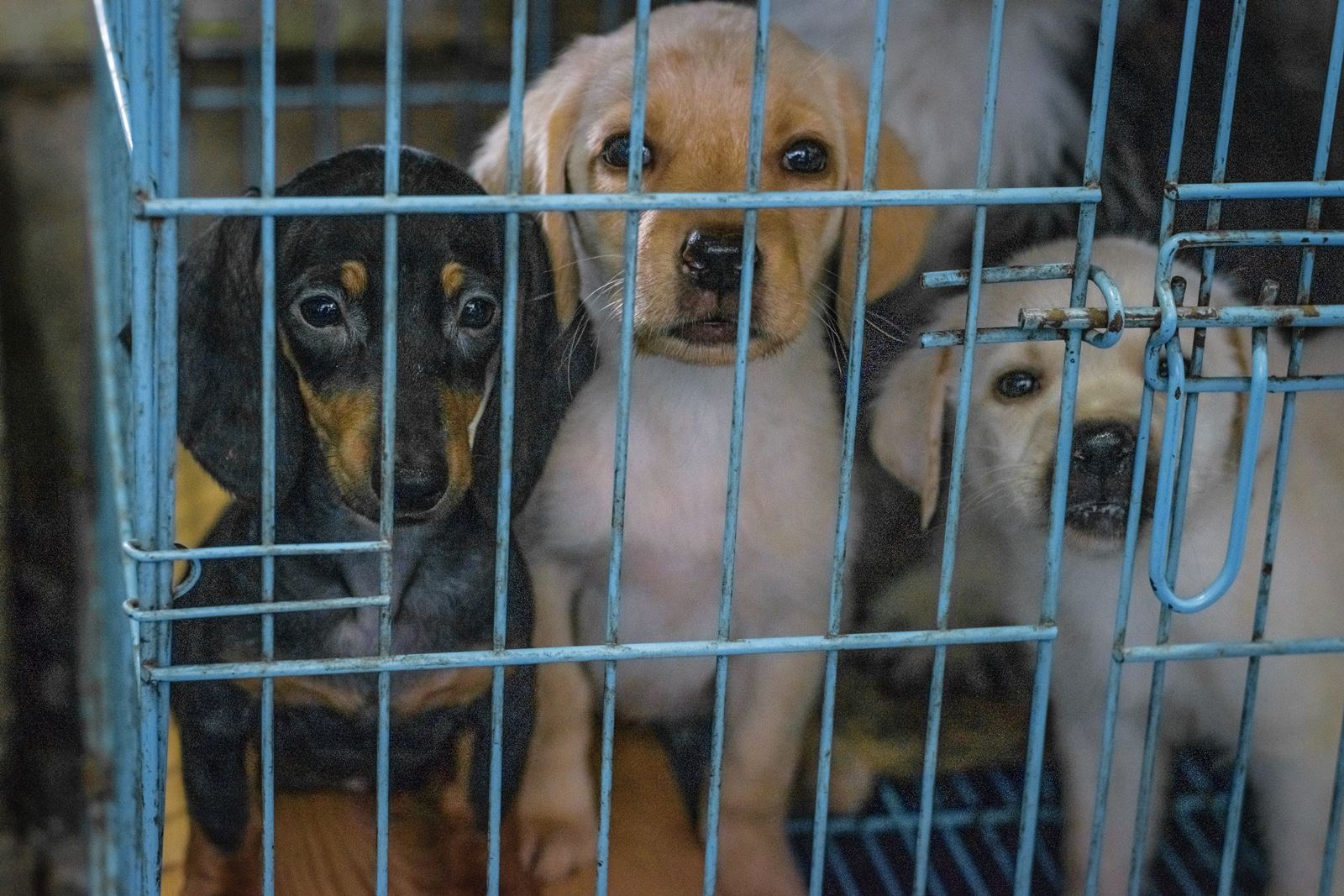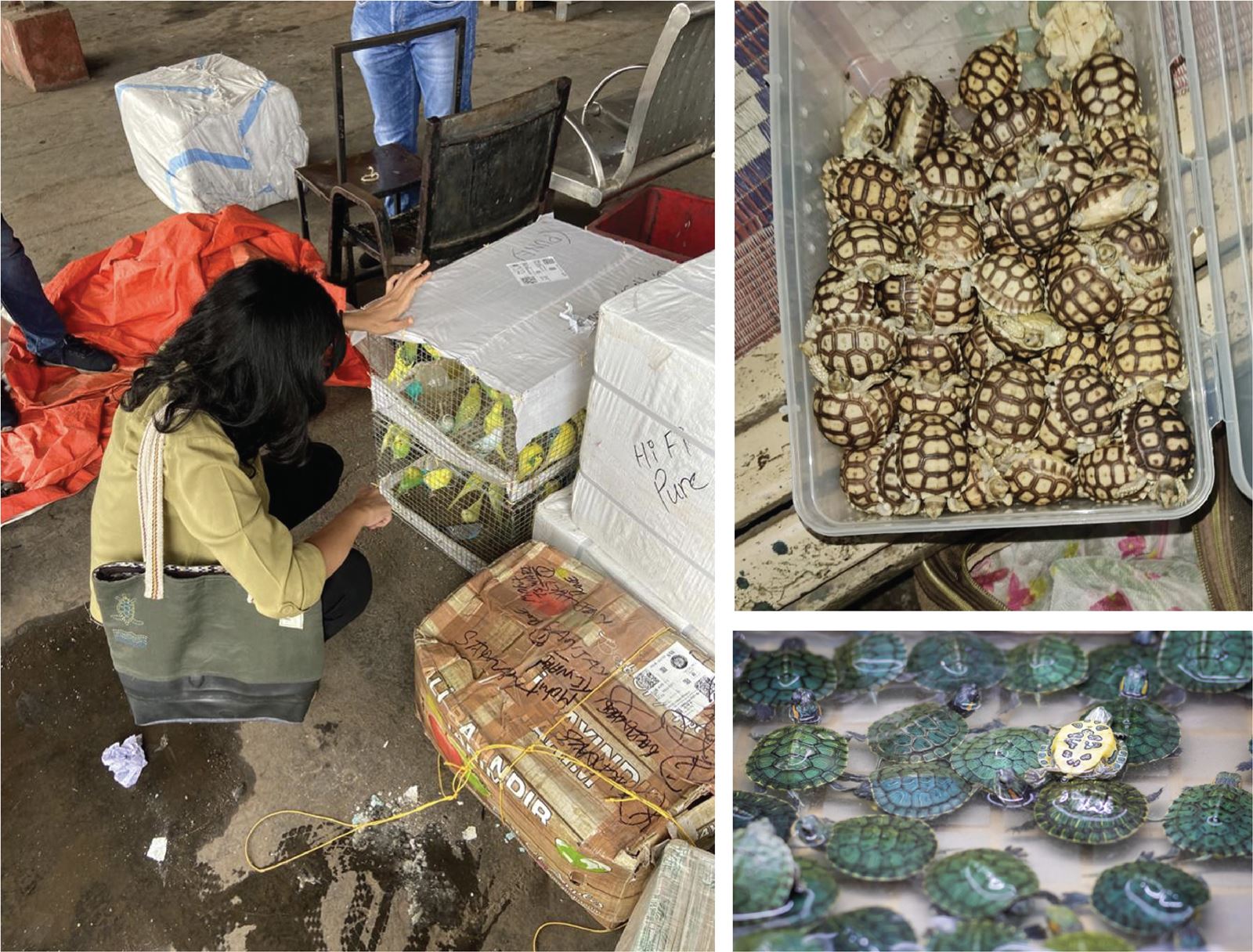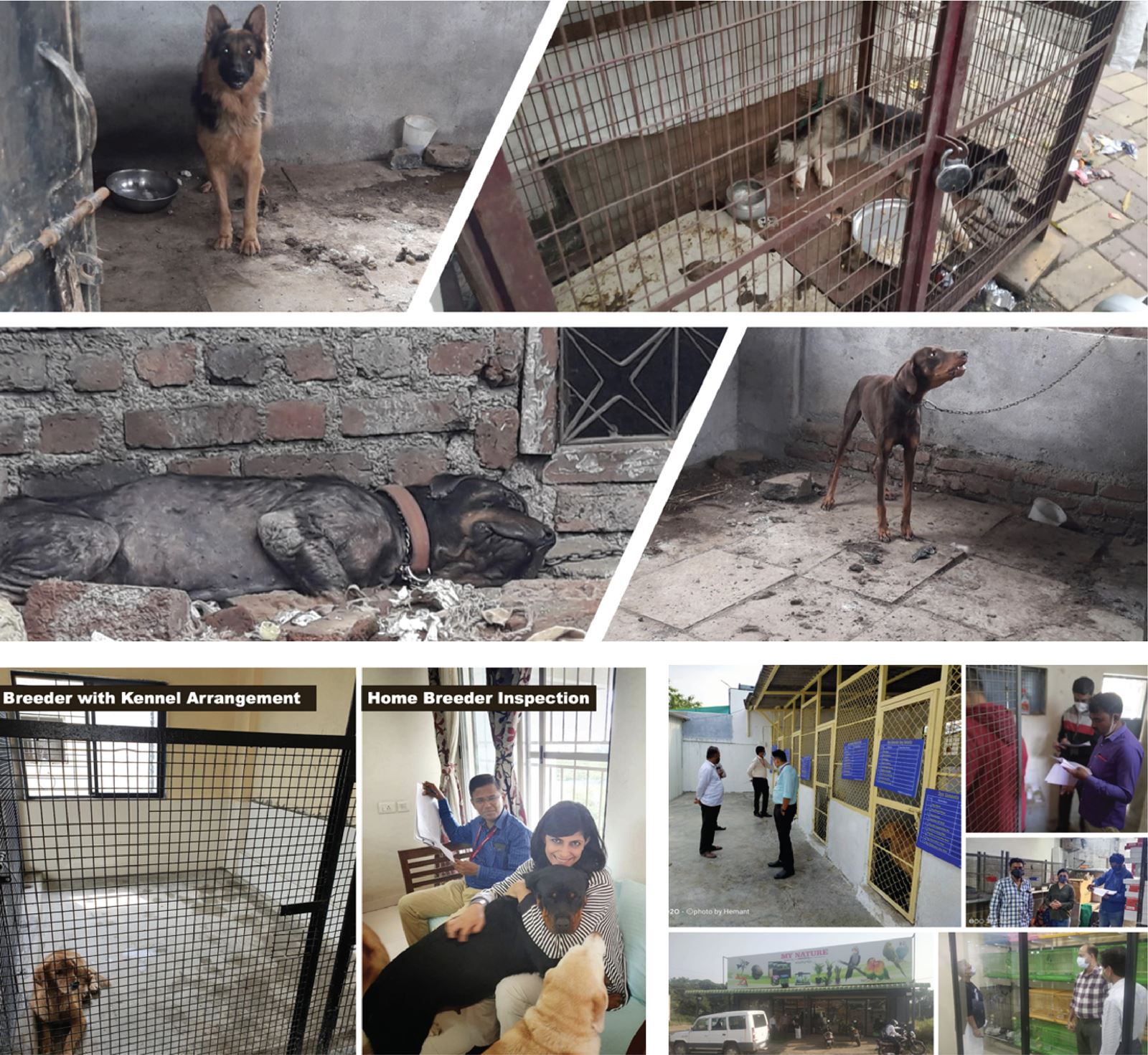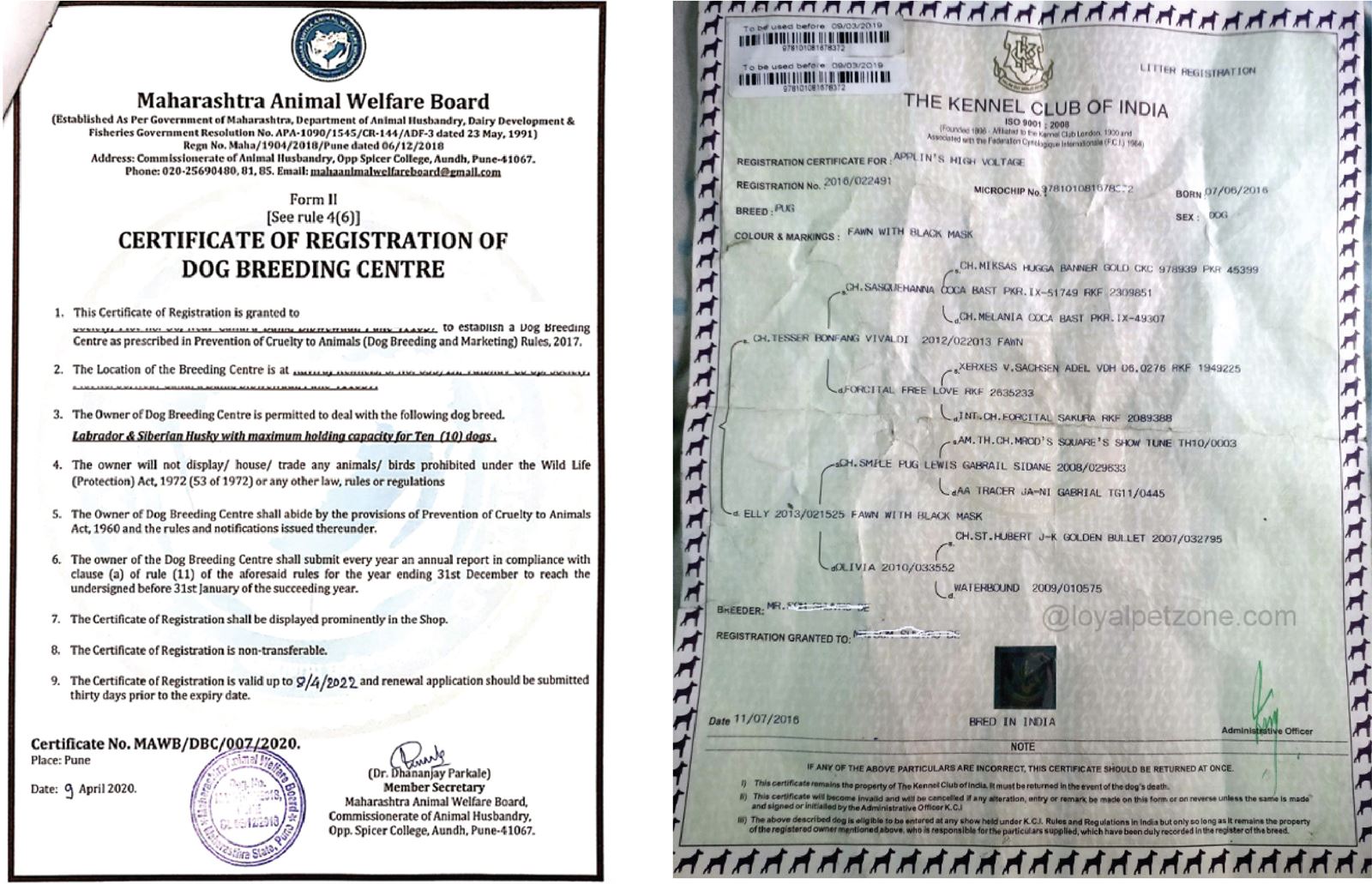1. “What should I ask for when I go to a Pet Shop (selling or trading in live animals) or contact a Dog Breeder while looking to bring home a puppy?”
Whoever you are getting a pet from, you have to ask them only for ONE thing - their “Registration Certificate granted to them by the State Animal Welfare Board”. If the individual, breeder, trader, pet shop does not have a valid certificate, please consider it a red flag and remember that it is not just an illegally run entity but completely unverified for maintaining animal welfare standards.
2. Is it important to check if the pet shop, trader or dog breeder is registered with the Maharashtra Animal Welfare Board?”
(i) It is against the law! In the year 2019, Maharashtra implemented two Indian laws regarding dog breeding and pet shops i.e. (i) Prevention of Cruelty to Animals (Dog Breeding and Marketing) Rules, 2017 and (ii) Prevention of Cruelty to Animals (Pet Shop) Rules, 2018. With the implementation in place, it is now against the law for a pet shop to sell or trade in live animals or for anyone to breed a dog (at home or in a kennel) without registering themselves with the Maharashtra Animal Welfare Board.
(ii) You may end up supporting poor animal welfare and illegal trade.

Puppies sold in Pet Shops: it is against the law to house puppies for sale in wire mesh cages such as this
3. Why do these laws exist, what do they say and how could you possibly (unintentionally) be contributing to poor animal welfare, wildlife trafficking and the illegal pet trade?!
For decades, lakhs of animals have been sold as pets and the pet trade is 280+ crore industry in India (2020). To meet the increasing demand of pets, a large amount of animal breeders, traders and pet shops indulge in trade and activities completely unregulated without maintaining any standards of animal welfare until newer laws and rules under the Prevention of Cruelty to Animals Act 1960 were notified in 2017 and 2018. It is the ground reality today that…
- Barring a few breeders who maintain acceptable welfare standards, majority of the puppies that are sold today are bred in horrifying conditions, where female dogs are crammed in cages and forced to breed and litter continuously their entire lives so that it can meet the demand of thousands of pet owners who want to bring a cute puppy of a particular type.
- Birds are crammed in cages with no space to fly and lakhs die just during transport to different cities and pet shops.
- Kittens and other small animals are often crammed, housed in inappropriate cages and displayed in pet shops, to lure customers into pity-buying and thereby increasing the demand of the trade.
- Exotic wildlife, i.e. non-indigenous species of turtles, monkeys, sugar gliders, iguanas are kept in inhumane conditions and traded rampantly. Often these are not just imported illegally, but bred under inhumane conditions and pose multiple biodiversity and zoonotic disease threats.

Large numbers of animals being transported to be sold as pets, often illegally trafficked and kept in poor housing conditions
4. “What is the Maharashtra Animal Welfare Board (MAWB) and what certificate do they provide?”
The MAWB is our state animal welfare board whose role is to ensure implementation of the Prevention of Cruelty to Animals Act 1960 at the state level, promote animal welfare and protect animals from unnecessary suffering.
- For Breeders: Before the MAWB grants a Breeding Registration Certificate to a person or kennel that wants to breed a dog, it deputes the responsibility of inspecting the home, facility, and animal(s) to the District SPCA (Society for Prevention of Cruelty to Animals). If the District SPCA Inspection Team (having a set inspection format based on an objective scoring system) is satisfied that the animal is being well looked after and that the place it is housed is in suitable for it, it reports that to the MAWB and specifies the breeds and number of dogs permitted to be bred by the breeder. Based on their inspection report the certificate is granted or rejected.
- For Pet Shops: Before the MAWB grants a Pet Shop Registration Certificate to an individual trader or pet shop dealing with live animals, it deputes the responsibility of inspecting suitability of the facility to house pet animals for sale to the District SPCA (Society for Prevention of Cruelty to Animals) based on specific guidelines provided in the law. If the District SPCA Inspection Team (having a set inspection format based on an objective scoring system) is satisfied with the pet shop facility, it reports that to the MAWB and specifies the maximum number of animals and types that can be permitted to be kept. Based on their inspection report the certificate is granted or rejected.

Inspections of Pet Shops and Dog Breeders being conducted by the District SPCA
5. What is the Kennel Club of India (KCI)?
- Registered under the Tamil Nadu Societies Registration Act of 1975 i.e. the KCI is a non-governmental entity that maintains the registry of purebred dogs in India.
- The club promotes and sanctions events for purebred dogs, including annual dog shows and specialty shows.
- The primary objective of the Club is to promote the scientific breeding of dogs and disseminate useful information for general use to those interested in the pure-bred dog.
- While the KCI lays down norms for breeding, promoting dog shows, obedience trials and maintains database for the pedigree of dogs registered with them for virtually the last 100 years, it does not check or inspect whether the dogs being bred are kept in humane conditions or if good breeding practices are actually being followed.
6. “What is the MAWB Registration Certificate and how is it different from the KCI certificate my puppy from a champion lineage is coming with?”

Welfare v/s Lineage: MAWB Certificate and KCI Certificate
- A MAWB certificate is granted to an individual person or company, breeder or pet shop that is selling the animal, whereas a KCI certificate is given to a pet owner/breeder for their individual dog.
- A KCI certificate will tell you about your dog’s bloodline and origin, but it will tell you nothing about the physical, mental or welfare conditions its parents or it was born and kept in by the breeder or trader.
- Most importantly, it is MANDATORY by Indian Law for a breeder or trader to have a MAWB certificate whereas the KCI certificate is not mandatory for your dog to have. The MAWB is a State-level committee authorized by the law whereas the KCI is a non-governmental entity/club. (read more about the MAWB and KCI below)
- You may buy a Labrador Retriever from a champion lineage showing that on the KCI certificate, however, it does not guarantee you that the pup or its parents have come from a place where its basic physical and mental welfare were maintained.
7. “I got my puppy from someone whose pet delivered puppies at home. They are not breeders for a commercial purpose. Does a regular pet owner who breeds their dog, even if just once, need to register with the MAWB?”
The Prevention of Cruelty to Animals (Dog Breeding and Marketing) Rules, 2017 state that no individual, group, or entity can breed a dog without being duly registered under the State Animal Welfare Board. It also specifies rules about breeding age, how many times breeding is permitted and lays down minimum standards of housing and care of dogs that will be bred. This is applicable to a breeder who has a kennel facility as well as an individual or family who maybe wanting to breed their family dog, even if 'just once'. It is irrelevant whether the dogs are sold for money or given free in adoption - if you want to breed a dog in this country, getting registration with the State Animal Welfare Board is MANDATORY.
8. “I got my pet animal through a person who just brought the animal home, I didn’t go to a pet shop and buy it from there. Is that legal?”
The Prevention of Cruelty to Animals (Pet Shop) Rules, 2018 states that pet shop, which includes a trader, wholesale or retail, offline or online, is not allowed to sell any live animals (barring fish) without being duly registered by the State Animal Welfare Board. It specifies several rules ensuring the welfare of animals being traded, minimum age of sale permitted (puppies cannot be sold under 60 days of age), as well as housing and care standards (specifies housing unit sizes for different species animals etc.) to be maintained in a pet shop. No pet shop selling live animals can operate from a temporary structure. It doesn't matter if a pet shop just has birds or is only bringing in the animal to 'hand it over to the buyer', if a live animal is traded through a pet shop or an individual, registration with the State Animal Welfare Board is MANDATORY.
9. "If it comes to my notice that a breeder or pet shop is selling animals without having a registration certificate or keeping animals in a poor condition, what can I do?"
In Pune District, you can report it on the District SPCA portal www.punespca.org and we will report it to the MAWB to list it as an unregistered entity and serve them a notice. You can also report it directly to the MAWB by sending them an email to mahaanimalwelfareboard@gmail.com
Shutting down illegal run entities will involve housing a very large number of seized animals and thus currently, the MAWB is working on an effective system to implement the shutting down of unregistered pet shops and breeders if they do not comply with the law and being served notices.
In the meantime, your report involving an illegally run entity (breeder, trader or pet shop) will make an important contribution to the Breeder and Pet Shop Directory Listing provide valuable guidance to a potential pet owner who they can or where they should procure an animal from.

Display of any animals outside pet shops and housing puppies and kittens in wire mesh cages is against the law
Photos: Anipixels.com